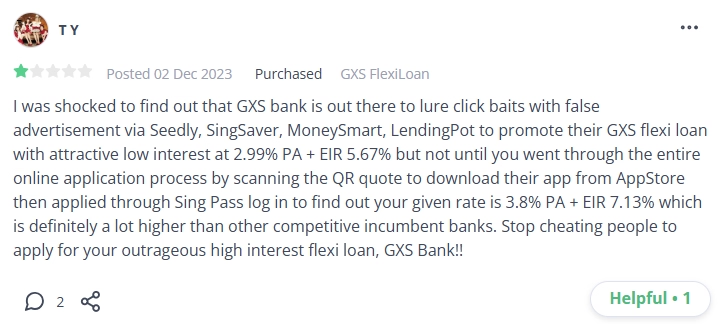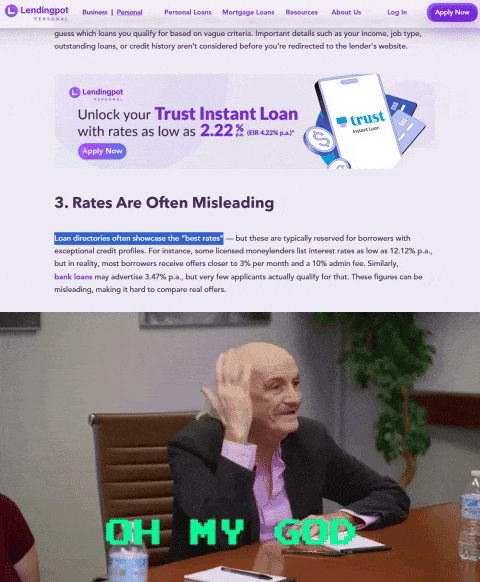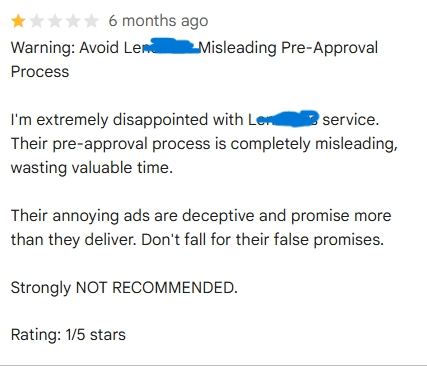OCBC Business Loan -- See what we found and what you need to watch out for.
Written at: 02 Oct, 2025
It’s natural to want to know how OCBC's loans work, how banks charge, or how soon they can respond. And you were searching online when you saw our link and thus this article. Unfortunately, as explained here, those answers only come after applying. Although MAS released the Guidelines on Standards of Conduct for Digital Advertising Activities in September, they’re still not comprehensive enough. In the UK, advertised “1%” or “1-hour” loans must apply to at least 51% of borrowers. That’s not yet the standard here — and intermediaries unaffiliated with banks remain a bigger concern. And this is why you need to read this article.

Credit: Public review found on Seedly and Google. What has this got to do with OCBC, you might be wondering?
As we have seen so many “comparison” portals or bloggers reviewing it, we thought we would chip in, but with a twist. We let it know how it works and if you can trust these reviews at all and when can you trust such information.
Not all comparison portals are what they claim to be—many are nothing more than sponsored listing sites, serving the advertisers that pay them.
Across markets from the U.S. to Australia, regulators are finding that these platforms often prioritize results based on payment, not on what’s truly best for the customer or consumer. What you see isn’t always an unbiased comparison but a filtered list bought by those who pay the most. MoneySmart alone claims 60 million users regionwide. That figure keeps drawing lenders and venture capital, even as such platforms face questions about transparency or what they really do for you. The least we can do is educate borrowers on how it really works.
While general information, such as miles or points per dollar spent, is easy to research, loan amounts and interest rates are highly personal. They change from one customer to another based on each individual’s credit score & profile. That rate they “reviewed” or “compared” for you is actually a teaser rate. Here’s how it works in detail. They are rates that you may or may not get, and in many countries, regulators are either suing them for clickbaiting consumers or publishing warnings on them.
But if you are pressed for time, you don’t have to read the article above - here is an image that says it all.

Credit: Head of Lendingpot. Strangely enough, Lendingpot appears to be exposing its own practices. For more of their contradiction or to join the conversation, click here. We called out conflicts of interest in lender-owned brokers. Later, they echoed the same words—even though they’re owned by IFS Capital & PhilipCapital! It makes one wonder if they’re simply lifting lines from our articles without thinking.
Every now and then, you’ll see websites like these, write comparisons like “this loan vs. that loan.” But think about it—if they claim to compare 10 loans, did they really take all 10 and pay interest on each one? So, are they reviews or just advertisements but disguised as comparisons?

In the UK, rules dictate that at least 51% of customers qualify for an advertised rate. Singapore offers no such protection. And even when rates are legitimate, what about the loan amount or term? A 1% rate isn’t meaningful if it’s only for $50 instead of the $5,000 you need. But the bigger problem comes when you trust a loan “comparison” website and take the recommended loan. Without comparing with other banks, you may pay thousands extra—missing out on a cheaper rate elsewhere. How this really works is explained in the article above.
And thus we built FindTheLoan.com, Singapore’s 1st loan hub. Instead of teaser rates or applying with multiple lenders one by one, you can reach multiple lenders at once with your actual documents, and they will make a full credit assessment as if you had walked in to them individually, and they will revert with their actual offer.
While finfluencers are still not regulated, they are at least being discussed in parliament. But loan reviewers don't seem to be under the same scrutiny, unlike those promoting investing. We invite you to share your thoughts on this LinkedIn post or on our Reddit, TikTok, or Facebook post, if you prefer, if that should be the case? However, we have tagged a number of MPs on LinkedIn who, during parliament, have asked about matters such as greater consumer protections. Weighing in there, and as more people share their thoughts there, could finally catch their attention to do something about the industry and better protect borrowers. Every comment, repost, or show of support matters — it increases the chances that policymakers take notice and act. We cannot prevent lenders from partnering with them, enriching them and expanding their reach. But we can call out misleading advertising and make things safer for consumers, SMEs, and borrowers.
"The world will not be destroyed by those who do evil, but by those who watch them without doing anything", Albert Einstein
If you enjoyed reading this, let others know by liking or commenting here. That small action helps push independent financial voices like ours to a wider audience, balancing the influence of Big Finance.
Stay connected through our LinkedIn newsletter here or Medium here.
We’ve also explored loan brokers and what to watch out for when using them, discussing how global precedents could inform Singapore’s still‑evolving regulations.
Share on:



